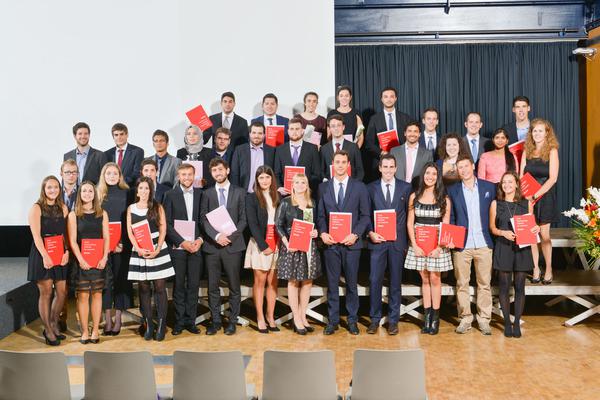Civil engineering: record number of graduates

© 2017 EPFL
The number of students who will obtain a Master's degree in Civil engineering in 2017 will be the most important of all the history of the EPFL. It remains nevertheless insufficient to cover market needs.
" We regularly hear about the necessity for the EPFL to contribute to the specialist training in hydraulics, in transport and in the other domains of the Civil engineering. With this record number of new graduates, we bring the proof of our efforts ", comments straightaway Lyesse Laloui, director of the Section of Civil engineering of the EPFL.
They will be about 90 in September, 2017 to celebrate the obtaining of their Master's degree in Civil engineering: a record for all the history of this discipline in the EPFL. Among them about fifteen female students, also a record number, obtained first time in 2014, then beaten in 2016, year when the EPFL freed 19 diplomas in Civil engineering to women. The trend increases: in 2018 and 2019, hundred qualified future are expected, among which respectively 19 and 26 women. As comparison, 1997 counted 47 graduates and a single woman.
The success of formation in Civil engineering leans on several factors, according to Lyesse Laloui. In the first one would come an important work of the EPFL on the image of the job itself. "The civil engineering asks for a high level of technicality which it was better necessary to put forward in our presentations in schools. I personally fought against the image of the civil engineer posted on a construction site, with a helmet and boots. This image does not represent anymore the complexity of the job. We also watched to show more women in our promotional videos. On this matter, I am anxious to underline that the students often make an academic route more prestigious than their male companions!"
Better rate of employability of the EPFL
Other element which would explain the attraction of the job: the high rate of employability which offers the formation of civil engineer. According to the last survey on the occupational integration of the graduates of the Center of career EPFL, these engineers rarely cross or little time by the compartment unemployment at the end of their studies. The Civil engineering is even the formation which presents the highest rate of employability of all the EPFL, in front of the financial Engineering and the Microtechnique, according to this investigation made in 2013. The only negative point - shared by other sectors of the EPFL: the level of salary does not seem often adapted to that of a superior formation, according to the questioned young graduates.

Master's degrees ceremony in civil Engineering on October 1st, 2016, year which saw a record number of graduates reaching the title. © Sedrik Nemeth
Numerous outlets
Once subscribers in the professional life, the civil engineers have various profiles of activities: the lovers of the technique turn to an engineering consulting firm, others devote to the management of big projects then, team, what asks for managerial, management financial and technico-legal capacities. Those who leave the profession will work in the finance or the computing, there also as administrators. " On the long term, the civil engineers are many to obtain places with responsibilities. Let us not forget that numerous leaders and CEO of Swiss companies graduated in civil engineering ", underlines Lyesse Laloui.
An insufficient answer to the need
The latter notes, however, in spite of an increase of graduates, the EPFs stays below the needs for the economy: "our wish would be to have graduates' double in the EPFL, that is about 200 people. This number would be a good answer to market needs and to need of civil engineers in Switzerland." An opinion so expressed by Flavio Casanova, director of the Group Gruner limited company, a construction company based in Basel, in the last number of the magazine published by the company. By means of a modelling, he indicates that about 500 graduates would be necessary to cover market needs. The article quotes in particular a study of the University of Basel published in 2014 establishing the needs for Switzerland in specialized workforce.
Towards the industry 4.0.
According to the State Secretariat of formation, the search and the innovation (SEFRI), the majority of the Swiss population could possess a diploma of the tertiary degree (High Schools and superior professional formation) before decade. The highest scenarios consider that the threshold of the 50 % will be already crossed in 2023. In comparison, this part was still 24 % in 2000.
This increase joins the will of the Confederation to guarantee the formation possessing the technological skills which involves the Industry 4.0. This one includes the technologies of the Internet for communication between human beings, machines and products. An evolution on the march that the section of Civil engineering of the EPFL already anticipates, as explains it his director : " The domain evolves towards always more digital modellings and the management of wide quantities of data to make, for example, the monitoring of dams, tunnels and bridges or the energy optimization of buildings. We thus adapt our teaching to this process. "
Unique interdisciplinary program in Switzerland
In this context, the students of Civil engineering are in particular brought to collaborate with their companions of the Sciences of the environment and Architecture from Bachelor through the program " Plan Together ". A specificity of the EPFL which aims, among others, at answering the new requirements of the world of the work. Explanations of Marilyne Andersen, dean of the ENAC, the faculty which hat these three networks: " the projects in these domains are more and more complex and ask for more collaboration and complementarity in the practical life".
2013-2016: Organisation d’une table ronde, d’une conférence et d’un sommet sur ces questions.